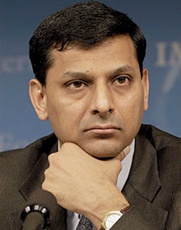Boosting domestic demand as important as ‘Make in India’: Rajan
13 Dec 2014
As Prime Minister Narendra Modi goes all out to turn India into a manufacturing hub with his 'Make in India' campaign, Reserve Bank of India governor Raghuram Rajan on Friday sounded caution, pointing out that India is not like China and the policy has its limitations.
 Rajan said the focus should be on domestic demand rather than solely pushing exports in a scenario of slowing global growth.
Rajan said the focus should be on domestic demand rather than solely pushing exports in a scenario of slowing global growth.
The Make in India campaign seeks to make the country an industrial hub like China, and boost the share of manufacturing in the economy to 25 per cent from the current 15-16 per cent, creating millions of jobs. The move is the centre-piece of the government's efforts to revive sluggish growth.
"I am counselling against an export-led strategy that involves subsidising exporters with cheap inputs as well as an undervalued exchange rate, simply because it is unlikely to be as effective at this juncture," Rajan said in his Bharat Ram memorial lecture in New Delhi, titled "Make in India Largely for India." He, however, made it clear that he was not advocating export pessimism.
With former Prime Minister Manmohan Singh – his previous boss, and an equally renowned economist - on the dais alongside him, Rajan said, "I am also cautioning against picking a particular sector such as manufacturing for encouragement, simply because it has worked well for China. India is different, and developing at a different time, and we should be agnostic about what will work," he said while applauding the broader objective of the drive launched by the government.
Dr Manmohan Singh, who was himself an RBI governor before being absorbed into politics, said the country's economic growth potential could notch 8-9 per cent provided there was a national consensus on taking advantages of opportunities provided by a globalised world.
Rajan was appointed amid wide acclaim by the Singh-led UPA government, and observers say it was a double treat to see Rajan and the former PM share the stage.
Rajan said slow-growing industrial countries would be much less likely to be able to absorb a substantial additional amount of imports in the foreseeable future.
"Other emerging markets certainly could absorb more, and a regional focus for exports will pay off. But the world as a whole is unlikely to be able to accommodate another export-led China," he said.
The former chief economist at the International Monetary Fund (IMF) said if external demand growth is muted then the country will have to produce for the internal market and called for creating the infrastructure to support this, including introduction of the goods and services tax (GST).
"We are more dependent on the global economy than we think. That it is growing more slowly, and is more inward looking than in the past means that we have to look to regional and domestic demand for our growth - to make in India primarily for India," he said.
"A well designed GST bill, by reducing state border taxes, will have the important consequence of creating a truly national market for goods and services, which will be critical for our growth in years to come," he said.
Rajan, who has been under pressure from the government to cut interest rates to help boost growth, said a central bank has to pay attention to financial stability in addition to inflation.



















